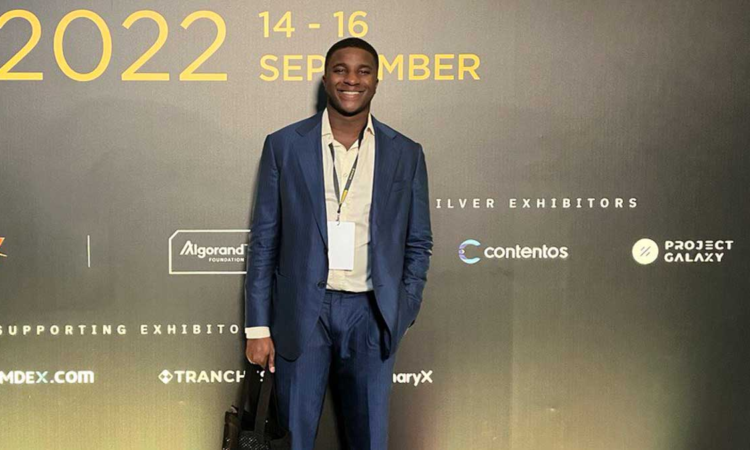'Nigerian environment perfect for web3, blockchain technology to thrive' – Guardian Nigeria

Mouloukou Sanoh
Mouloukou Sanoh is the co-founder of Cassava Network, a Web3 platform, which is keen on driving Web3 adoption in Africa, He was at Mansa Capital, an investment advisory firm that helps African startups raise funds. In this interview, he tells TOBI AWODIPE about Web3 adoption, why Nigeria is ready to explore the metaverse and why government regulation is needed to protect the space.
Crypto, metaverse and blockchain technology are emerging terms in Nigeria, but not many people know exactly what they mean and how they work?
Blockchain technology can be considered as a second or even third iteration of the Internet; they are decentralised nodes that are immutable and this means they can’t be tampered with. Everything stored on the blockchain will remain there forever as it is built on decentralization, which means it is a trustless protocol in the sense that there is not one central party that controls it. Crypto can be considered as the fourth iteration of money, we progressed from silver/gold to paper cash, then digital currency and now to crypto.
The metaverse can be considered and defined as the virtual realm built on the blockchain, which uses digital currencies such as crypto as its means of payment. Everything we’re doing now is focusing on educating our customers and the public, which is why on all our social media handles, most of our posts focus on educating users on terms like blockchain, wallets, NFTs; their future potential and how people can benefit. We believe that when we educate the general public, it would lead to mass adoption. We just signed a partnership with Pan-Atlantic University (PAU) and Lagos Business School, together with Emurgo, one of the co-founding entities of the economic blockchain and one of the world’s largest crypto companies with a market capital of $12 billion.
In addition to being the co-founder of Cassava network, I am also an investment manager with the latter. The partnership is centered around blockchain courses, we’ll also be doing research with the universities’ I.T departments and hold boot camps; all in a bid to further education in the blockchain space. We are also releasing a book, The ABC’s of Blockchain, this quarter, explaining the basics of blockchain and giving examples. It will be co-published with PAU and given out free. Cryptocurrencies and the metaverse live on the blockchain.
What are the immediate and long-term benefits of the three for average Nigerians?
Nigeria’s problems are Africa’s problems and they include inflation, currency devaluation, and difficulty in sending money within and across Africa amongst other things. Africa also has a huge unbanked population; about 397 million people remain unbanked or under-banked. Crypto can help with this. Mobile phone penetration is quite high and this can double as a mobile wallet; they can send and receive money through a crypto wallet as long as there is a SIM card and Internet connection. Think of small farmers in remote villages; he can send and receive digital currencies, gain financial history and apply for loans. Cryptos have what is called a stable coin, like the USDTs, which is a digital version of the U.S dollar.
Anyone who is trying to hold U.S dollars to hedge against inflation can buy a stable coin like a USDT. I can send money from here to that farmer in Kano state and he would get it in seconds compared to the traditional system that takes hours, sometimes even days or weeks. From my business account in Hong-Kong, I cannot send money to Nigeria because Nigeria is blacklisted there. These are the barriers that cryptocurrency surmounts easily, helping the unbanked and under banked access financial services easily, hold US dollars as well as send and receive money.
You are building a Web3 platform focused on gaming and Non Fungible Tokens amongst other things, how are you looking to do this?
We have a multi-chain wallet where users can send and receive cryptocurrencies across different blockchains such as Binance and Ethereum and other different chains. It also allows them to hold NFTs among other things. We’re also building an NFT platform in partnership with Boomplay and working with stars like Burnaboy, Wizkid, Davido and helping them create NFTs that help them stay close to their fans. We also want to work with digital and physical artists as well as create a reward platform where users get rewarded for using the different platforms. For instance, you get rewarded for listening to a song on Boomplay or by playing a game, sending money and so on. We also partnered with global Web3 games, helping them organise activities across Africa. We’re focusing on Web2 verticals because it is easy to move from that to Web3 and we’re looking at being the bridge that connects users.
Are there concerns that Web3 might not gain quick adoption here looking at the level of Internet literacy in this region?
Not at all, web3 is made for Africa and other emerging markets. Nigeria has a large youth population with a huge number that grew up with the Internet; this is the perfect environment for web3 to thrive. We need to keep educating users and ensure that our products keep improving their lives, making it more efficient and give them opportunities to earn money. I also believe that once the government sees the positive impact it is having on the people, they would come around to fully adopting it. It is a long game but we’re committed to Web3 and to Africa.
Is the Nigerian ecosystem ready to explore the metaverse as well as blockchain technology seeing as crypto is still not legally recognised?
The government cannot completely stop crypto; Nigeria, South Africa and Kenya are among the world’s highest owners of cryptocurrencies per capita and Africa has the world’s highest Peer-to-Peer (P2P) transaction rate for cryptos so I am not worried. Last year, the Nigerian government signed a deal with Binance to create a crypto city. I believe regulation is the way to go because there are a lot of scammers out there and these scams flourish because of no education of what cryptos are and it is perceived as get-rich-quick scheme and also, the regulation doesn’t allow companies to be transparent and open; helping users make informed decisions. The government should enact regulations that foster innovation and clamp down on scammers.
How do you intend to manage the issue of trust, which has largely been eroded in the ecosystem?
I would answer this from the Cassava Network and then the investor perspective. From the former’s perspective, we are not a financial risk company. We don’t facilitate payment, we help users earn rewards, expand their means of income, help them discover and access other Web3 companies and services. From the investor perspective, it is all about understanding the user’s pain points and solving the same. There are few very successful crypto companies that we have invested in, such as Bitmama, which was founded by a woman, Ruth Iselema.
It all comes down to understanding pain points, solving them and educating users. Banks are centralised entities while most crypto companies are decentralised, nobody can take the money in your online wallet. Crypto doesn’t close, it’s on 24 hours and you’re in total control of your money at all times. Compared to traditional banks, the fees are very tiny, depending on what blockchain is being used. Money kept in crypto wallets is very safe and even if the exchange goes down, your money is still safe. The main difference between crypto and the current financial system is the reach and scale of the former, which is bigger.
What innovation is Cassava Network bringing out this year?
We’re raising the second version of our products where users can earn rewards by completing tasks. We also signed a partnership with Grammy award winning producer, LeriQ’s NFT platform, African Valuables Collective. We are also creating a music camp next month and inviting top Nigerian and South African artists to create music and sell the album as an NFT; with add-on benefits like the album, merchandise, early notification and discounts. We also want to work with big festivals like Afrochella, Afronation and help them sell concert tickets as NFTs. We will be working with our partners, launching marketing campaigns and holding events.
You must be logged in to post a comment.
Why are you flagging this comment?
I disagree with this user
Targeted harassment – posted harassing comments or discussions targeting me, or encouraged others to do so
Spam – posted spam comments or discussions
Inappropriate profile – profile contains inappropriate images or text
Threatening content – posted directly threatening content
Private information – posted someone else’s personally identifiable information
Before flagging, please keep in mind that Disqus does not moderate communities. Your username will be shown to the moderator, so you should only flag this comment for one of the reasons listed above.
We will review and take appropriate action.
Get the latest news delivered straight to your inbox every day of the week. Stay informed with the Guardian’s leading coverage of Nigerian and world news, business, technology and sports.
Follow Us







